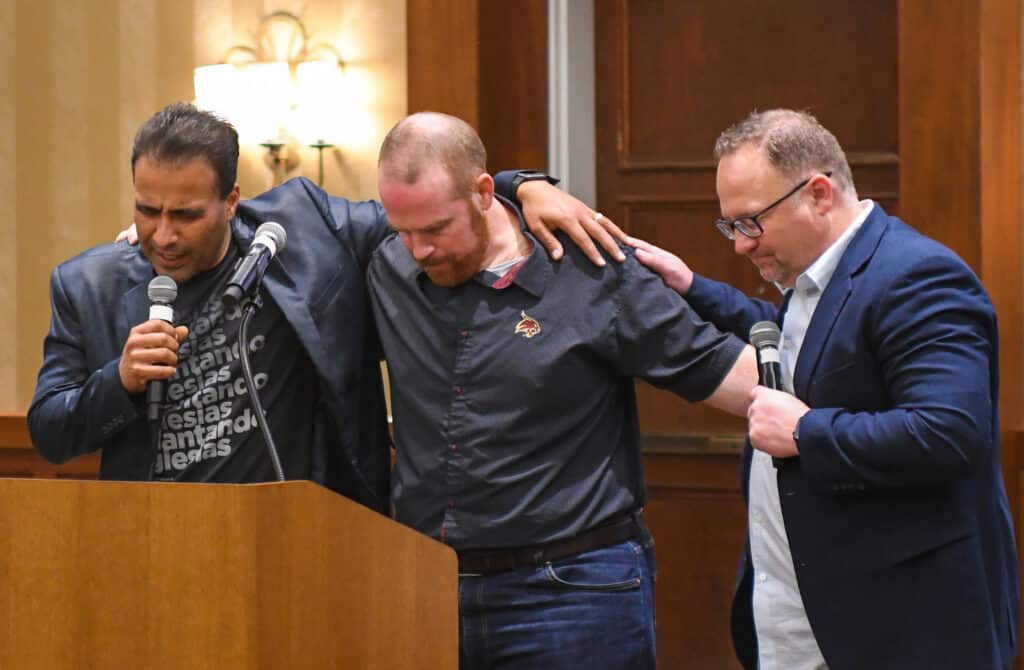HOUSTON—The U.S. Court of Appeals Fifth Circuit heard arguments April 7 from lawyers representing two Texas Baptist universities demanding an exemption from the Health and Human Services contraceptive mandate and the “draconian fines” levied for non-compliance. In a press conference outside the U.S. court house in Houston, representatives for the schools said their identity as Christian institutions and financial solvency is threatened by the government’s demands.
A federal judge in December 2013 ruled in favor of the plaintiffs, East Texas Baptist University and Houston Baptist University, exempting the schools from compliance with the U.S. Health and Human Services mandate requiring employers to provide for their employees insurance coverage for contraceptives, including abortifacients. The federal government appealed, forcing the universities to continue to defend in court their identity as Christian institutions.
“It’s not just a simple matter. It’s not only a theological matter, as important as that is today, or only a matter of a sincerely held religious belief,” HBU president Robert Sloan told reporters outside the courthouse following the hearing.
“In some ways our right to exist as an institution to hold these beliefs and perhaps even our very survival as a whole is at stake.”
Sloan said East Texas Baptist University and Houston Baptist University v. Burwell “is clearly a matter of religious freedom.” HBU’s Christian underpinning and pro-life values “are not incidental” but “core convictions at the very heart of the Christian faith,” and compulsory violation of those convictions by the federal government is unconscionable.
“When somebody comes and tells me that my school has to do something it doesn’t want and it’s infringing on [the] rights given to it by the very supreme law of the land my heart breaks,” HBU freshman Jasmine Kelley told the TEXAN following the press conference. The government major was among a handful of HBU students who attended the press conference in defense of their school.
Attorney Eric Rassbach, deputy general counsel for the Becket Fund for Religious Liberty, defended the two universities in the case. The non-profit law firm defends the religious expression of people from a variety of faiths and, most notably, successfully defended the craft store giant Hobby Lobby before the U.S. Supreme Court against the same mandate.
“We’re in court today because [the universities] have been put to a terrible choice between following their most deeply held religious convictions and paying outlandish fines,” Rassbach said.
The non-compliance penalty of $100 per employee per day totals $12 million and $8 million a year, respectively, for HBU and ETBU. Scores of other private religious institutions around the country are in the same fight, and at least one of those cases will likely end up before the U.S. Supreme Court.
“Our clients have a religious objection to abortions,” said Rassbach. “They don’t want to pay for abortions. They don’t want to help people get abortions. They are not looking to impose their will on anyone else. They just don’t want to be involved,” said Rassbach.
He argued the compliance exemption afforded churches should also apply to all religious institutions like his clients. The imposition of government requirements antithetical to a religious institution’s mission also illustrates the need for religious liberty legislation on the state and federal level.
But in recent weeks religious liberty laws have come under fire. Legislatures in Indiana, Arkansas and about 10 other states including Texas are drafting laws giving legal protection to individuals and businesses against government intrusion in matters of religious convictions. The religious liberty laws do not codify an individual’s or business’s “right to discriminate” as charged by detractors.
Jonathan Saenz, an attorney and president of Texas Values, told the media, “The reason we are here today is because we have a federal law called the Religious Freedom and Restoration Act … that gives private, religious institutions a fighting chance in court when the government comes calling.”
Rassbach said Becket Fund attorneys have relied on the federal RFRA law in all of arguing its cases across the nation.
“It never occurred to me that the government would try to force HBU to change its mission,” said Morgan St. John, an HBU senior education major.
Joshua Jones, a senior government major, said he has seen the devastation caused by abortion and will fight any government mandate that makes him or his school complicit in its administration.
Mon ‘Sher Preston agreed. The HBU alumnus and director of student involvement and leadership told the TEXAN she was encouraged by the students’ willingness to take a stand on behalf of their convictions and their university.
In its effort to force religious entities to comply with the mandate, the government has put itself in the position of determining what institutions are and are not guided by deeply held religious convictions, Rassbach explained.
“It sets a very dangerous precedent,” Rassbach said, “for the government to come in and say, ‘Well, we just don’t think you’re really religious.’”
He said the government can ferret out fraud,“but what they can’t do is question the validity of those beliefs.”
Asked if the universities could fulfill the mandate by hiring a second party to administer the contraceptive mandate, Rassbach said, “There is nothing wrong with having some insurance regulation, but when you say we have to go out and get an insurance company that is going to provide this stuff we’re morally complicit. You don’t just say we have to outsource our consciences to somebody else.”
He said the circuit judges were very engaged during oral arguments Tuesday and asked “very penetrating questions of all parties.”
“I’m hopeful that we will have another ruling in our favor,” he said. “We were right back in December of 2013. And we’re right today. And we’re going to be right again tomorrow.”














